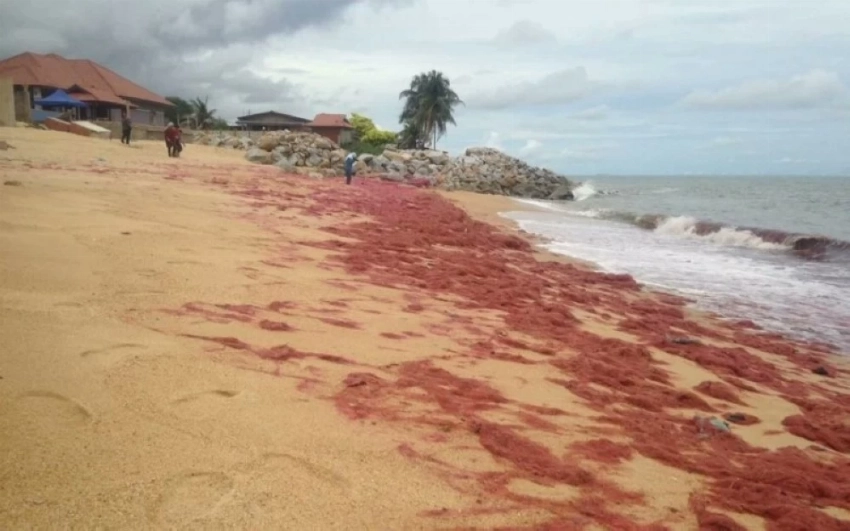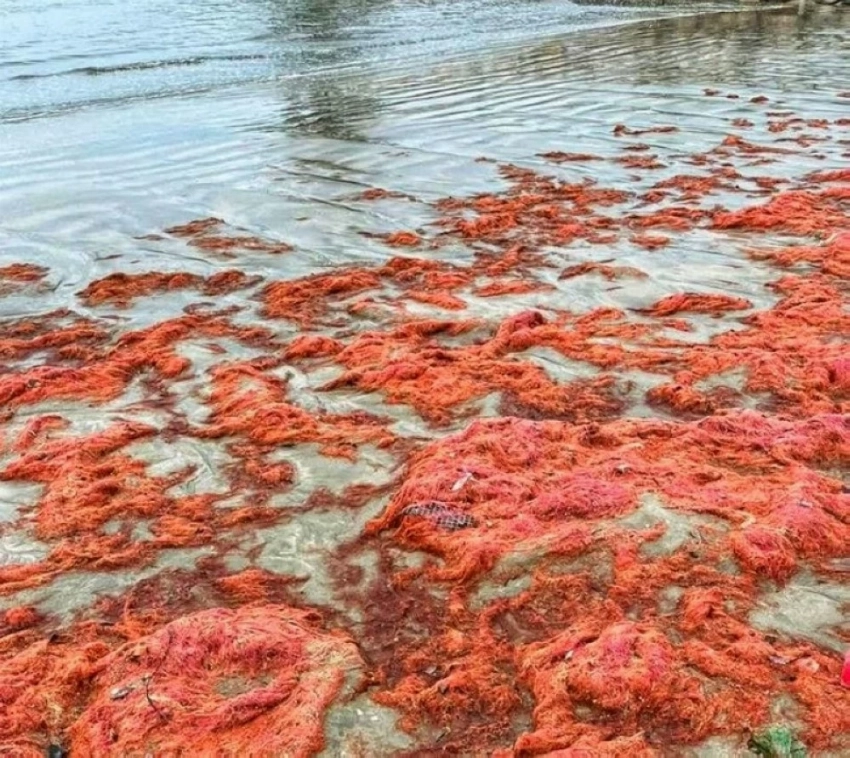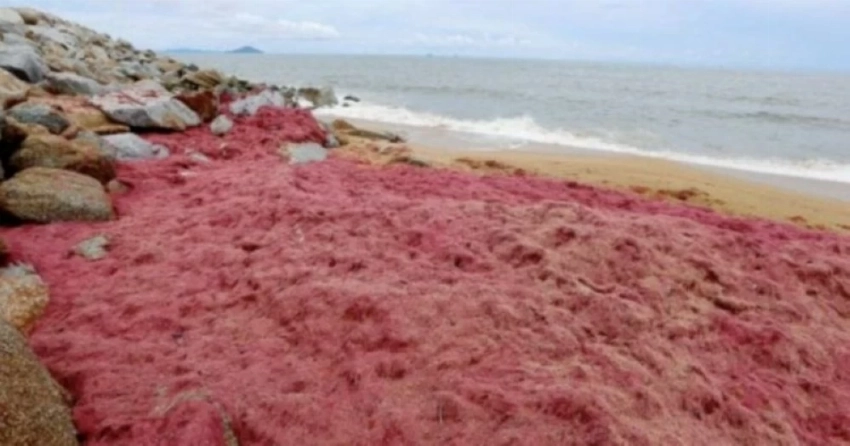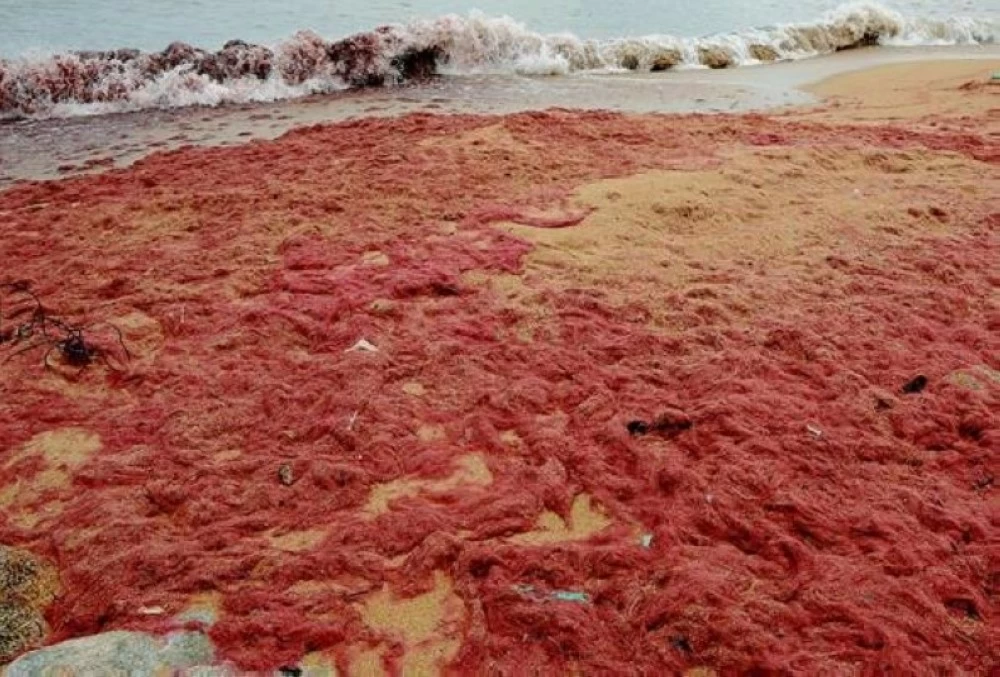حذرت السلطات الماليزية أمس، الجمهور من لمس أو الاقتراب من «الأعشاب البحرية الحمراء» على شواطئ المناطق الشمالية الغربية، خصوصاً في ولاية بينانغ، بسبب مخاطر صحية جسيمة، في تطور يثير القلق بين السياح والسكان المحليين.
وأفادت وزارة الزراعة والصيد البحري الماليزية، في بيان رسمي بأن هذه الأعشاب، المعروفة علمياً باسم «الطحالب الحمراء»، تحمل سموماً طبيعية قد تسبب تهيجاً جلدياً حاداً، ومشاكل تنفسية، وحتى تسمماً غذائياً إذا تم تناولها عن طريق الخطأ.
وبدأت موجات الطحالب الحمراء تظهر على الشواطئ منذ أوائل نوفمبر، مدفوعة بتيارات المحيط الهندي القوية والعوامل المناخية، وفقاً لتقارير الوزارة.

وأكد الخبير في علم الأحياء البحرية من جامعة بينانغ الوطنية الدكتور أحمد بن علي، أن «هذه الطحالب تنتج سموماً مثل الكاروتينويدات التي تسبب حروقاً كيميائية عند اللمس، وقد تؤدي إلى أعراض مثل الطفح الجلدي، والغثيان، والدوخة إذا استُنشق الدخان الناتج عن حرقها».
ونصح الخبراء بارتداء قفازات واقية لأي عمال نظافة، وتجنب السباحة في المناطق المتضررة، مع الاتصال بخط الطوارئ الصحية (999) في حال التعرض للأعشاب.

وشهدت شواطئ مثل «تانجونغ توتو» و«بينانغ الغربية» إغلاقاً مؤقتاً للأنشطة الترفيهية، ما أثر على آلاف الزوار خلال موسم السياحة، وانتشرت صور على وسائل التواصل الاجتماعي تظهر كتلاً هائلة من الطحالب الحمراء تغطي الرمال، مع تحذيرات من قبل نشطاء البيئة بأن التغير المناخي يفاقم مثل هذه الظواهر، وحتى الآن، لم تُسجل أي حوادث خطيرة، لكن السلطات تتابع الوضع عبر فرق مراقبة بحرية.
ويُعد انتشار الطحالب الحمراء جزءاً من ظاهرة عالمية تُعرف بـ«ازدهار الطحالب» التي تشهدها المناطق الساحلية بسبب ارتفاع درجات الحرارة وتلوث المياه، وفي ماليزيا، سجلت حالات مشابهة في 2023 على شواطئ كيلانتين، حيث أدت إلى إغلاق صيد الأسماك وخسائر اقتصادية بلغت ملايين الريالات.
ووفقاً لتقارير الأمم المتحدة، أدى الاحتباس الحراري إلى زيادة هذه الازدهارات بنسبة 20% في المحيط الهندي خلال العقد الماضي، ما يهدد التنوع البيولوجي والصحة العامة.
Malaysian authorities warned the public yesterday against touching or approaching the “red seaweed” on the beaches of the northwestern regions, especially in Penang, due to serious health risks, in a development that raises concerns among tourists and local residents.

The Malaysian Ministry of Agriculture and Fisheries stated in an official announcement that this seaweed, scientifically known as “red algae,” contains natural toxins that may cause severe skin irritation, respiratory issues, and even food poisoning if ingested accidentally.
Red algae blooms have begun appearing on the beaches since early November, driven by strong currents from the Indian Ocean and climatic factors, according to reports from the ministry.

Dr. Ahmad bin Ali, a marine biology expert from the National University of Penang, confirmed that “these algae produce toxins such as carotenoids that cause chemical burns upon contact, and may lead to symptoms such as rashes, nausea, and dizziness if the smoke produced from burning them is inhaled.”
Experts advised wearing protective gloves for any cleaning workers and avoiding swimming in affected areas, while contacting the health emergency line (999) in case of exposure to the seaweed.

Beaches such as “Tanjung Torto” and “Western Penang” have experienced temporary closures of recreational activities, affecting thousands of visitors during the tourism season. Images have circulated on social media showing massive clumps of red algae covering the sands, with environmental activists warning that climate change exacerbates such phenomena. So far, no serious incidents have been reported, but authorities are monitoring the situation through marine surveillance teams.
The spread of red algae is part of a global phenomenon known as “algal blooms” occurring in coastal areas due to rising temperatures and water pollution. In Malaysia, similar cases were recorded in 2023 on the beaches of Kelantan, leading to fishing bans and economic losses amounting to millions of ringgits.
According to United Nations reports, global warming has increased these blooms by 20% in the Indian Ocean over the past decade, threatening biodiversity and public health.

